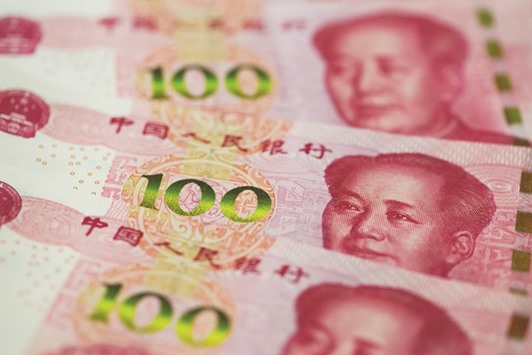The rally that’s driven Chinese stocks in Hong Kong to the cusp of a bull market will falter as concerns over yuan volatility and rising debt resurface, says Aberdeen Asset Management.
The Hang Seng China Enterprises Index is up 16% since slumping to an almost seven-year low in February, outpacing the 9.7% rebound by MSCI’s global gauge. Shares in the city advanced as the yuan stabilised, central banks around the world took steps to boost stimulus and commodity prices rebounded. Aberdeen Asset’s Nicholas Yeo isn’t convinced the calm will last.
The H-share gauge is experiencing a “bear market rally or a dead cat bounce,” not a bull market, said Yeo, head of China and Hong Kong equities and a director at the fund manager, which oversees about $430bn. “Some of the flows in equities are not really due to equities but due to taking a view on the currency.”
China’s shock yuan devaluation in August and the currency’s slump to a five-year low in January heightened concern about the nation’s economic outlook and triggered a flight from risky assets around the world. While central-bank intervention helped the yuan erase its 2016 drop this month and price swings have abated, jitters remain. China’s companies are seeking hedging services like never before and analysts surveyed by Bloomberg expect the currency to weaken 4% by the end of the year.
“Once that fear comes back again, that might trigger another runoff,” Yeo said.
The Hang Seng China index dropped 1.9% to 8,701.13 at Thursday’s close for the steepest loss in a month. The gauge plunged 19% in 2015, the worst performer in Asia, amid concerns about China’s deepening economic slowdown and as a weaker yuan spurred capital outflows. The measure traded as low as 5.6 times reported earnings last month, the cheapest since at least 2001, according to data compiled by Bloomberg.
Stocks on the mainland also slumped in early 2016 before climbing, with the Shanghai Composite Index paring its decline this year to 15% and the ChiNext index of smaller companies entering a bull market on Wednesday. Yeo said a year ago that mainland small-cap stocks were trading at bubble valuations, before the ChiNext sank 55% from a June peak to its September low.
Yeo says he’s sceptical about the current rally in H-shares because it doesn’t reflect an improvement in the outlook for China’s economy or corporate profits, and he’s concerned that companies have too much debt.
The nation’s industrial production and retail sales grew less than forecast in the first two months of the year, while analysts are forecasting a 4% decline in earnings per share for the Hang Seng China gauge over the next 12 months.
Chinese leaders are struggling to balance their target of at least 6.5% average annual growth through 2020 with a need to rein in borrowing. Central bank Governor Zhou Xiaochuan said on Sunday that corporate lending as a ratio to gross domestic product had become too high. Goldman Sachs Group has raised its estimate of potential non-performing loans in the banking industry to about 8% to 9%, from a previous prediction of between 4% and 6%. That compared with the official figure of 1.7% at the end of 2015.
“If growth comes down, all this bad debt will surface, will come out even faster,” Aberdeen’s Yeo said. “This could be a big number, or this could be a small number but nobody knows.”
Yeo said he subscribes to the view that China will avoid the kind of hard landing predicted by the likes of billionaire investor George Soros.
China is “transitioning from investment-led to consumption- led. You don’t want to stall halfway, and then the economy would collapse and that’s your worst-case scenario, which is a hard landing,” he said. The probability of that “is not very high,” he said.
The fund manager is positive on Chinese travel stocks along with traditional medicine companies. Property developers and coal companies have been “oversold,” Yeo said, without naming specific shares. Still, overall he’s far from bullish.

China’s yuan devaluation in August and the currency’s slump to a five-year low in January heightened concern about the economic outlook and triggered a flight from risky assets around the world.
